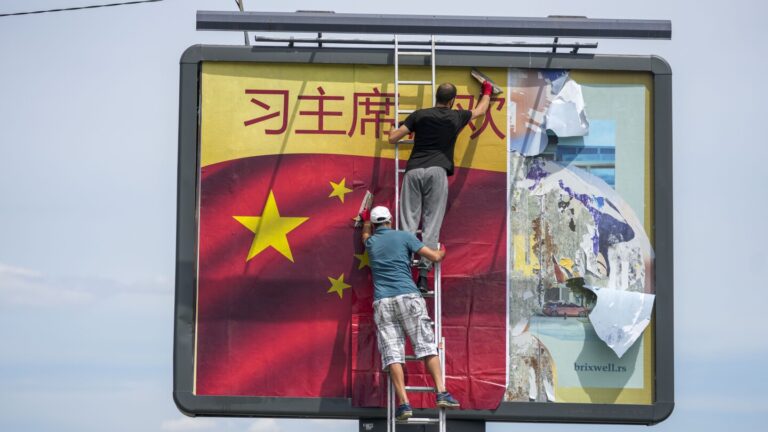BELGRADE, Serbia (AP) — Chinese leader Xi Jinping European ally Serbia’s visit on Tuesday marks the 25th anniversary of the bombing of the Chinese embassy in Belgrade during NATO’s air war against Kosovo.
On May 7, 1999, U.S. warplanes dropped five bombs on the Chinese embassy compound in the Serbian capital, setting it ablaze and killing three Chinese nationals. The bombing injured 20 other people and has strained relations between the two countries ever since.
“Twenty-five years ago today, NATO brazenly bombed the Chinese embassy in Yugoslavia,” Xi said in an editorial published Tuesday in Serbia’s Politika newspaper, according to a translation by Chinese state media. Don’t forget,” he said.
“The Chinese people value peace, but we will never allow historical tragedies to happen again,” Xi added.
The Western military alliance launched an air campaign in March of that year to force then-Serbian strongman Slobodan Milosevic to end a brutal onslaught against ethnic Albanian rebels in Kosovo.
At the time, the United States apologized and said the embassy bombing was a mistake caused by flawed intelligence. According to the US government, the intended target was the headquarters of the Serbian state arms export company, located several blocks away on the same street.
“Imagine someone storming an American embassy anywhere in the world, even by accident. The reaction would be immediate,” says the director of European Diplomacy and Security at Ghent University and the Egmont Institute. said Sven Biscop, professor of security policy.
“So it’s also clear that for a country like China, this is a big thing,” he added. “And of course it hasn’t been forgotten.”
The bombing stoked anti-American sentiment, fueled speculation that the attack was intentional rather than accidental, and angry Chinese protesters stormed a US diplomatic facility. Distrust over this incident continues to this day.
“In the end, we’ll probably never know either way,” Biscop said. “But one thing is for sure. Such incidents do happen in war, but I usually tend to go for the simplest explanations rather than come up with complex theories.”
While relations between China and the United States have been strained, the embassy bombing has brought closer ties between China and Serbia. China is Serbia’s largest provider of foreign direct investment and has emerged as its second-largest trading partner after the European Union.
Beijing opposed the NATO bombing campaign and has since supported Belgrade’s efforts to counter the Western-backed push for independence for the former Serbian province of Kosovo. In return, Serbia has been a staunch ally of Beijing and has opened its doors to billions of dollars in Chinese investment without restrictions, even as it formally seeks EU membership.
“The friendship forged in blood between the peoples of China and Serbia will serve as a common memory for the two peoples and encourage them to move forward together,” Xi wrote. “We, together with our friends in Serbia, remain true to our original aspirations, progress hand in hand, write a new chapter in the development and revitalization of our nation, and have a common future for humanity in a new era. We want to build a Sino-Serbian community.”
Signs of pro-China sentiment were evident ahead of Xi’s visit on Tuesday and Wednesday. In Belgrade, a huge Chinese flag was hoisted on a high-rise building along the road leading into the city from the airport. Small Chinese and Serbian flags could be seen downtown and along the highways.
MiG-29 fighter jets from the Serbian Air Force escorted President Xi Jinping’s presidential plane to Belgrade Airport.
Mr. Xi arrives from france He will then travel to Hungary as part of his first European tour in five years.
The Prime Minister is scheduled to visit the site of the former embassy and express his condolences to the victims of the bombing. The Chinese Cultural Center now stands where the embassy once stood.
The vast complex reportedly includes a Confucius Institute, workshops, exhibitions, offices, residential space and a hotel. This is seen as a symbol of China’s growing influence in Serbia and across Europe.
Near the institute, a group of Chinese visitors last weekend bowed before a simple black marble monument and laid flowers in memory of the victims of the 1999 bombing. The monument is inscribed in Chinese and English with the words “Honor the martyrs and cherish peace.”
___
Associated Press writers Sylvain Plagie in Brussels and Christopher Bourdain in Taipei, Taiwan, contributed to this report.

